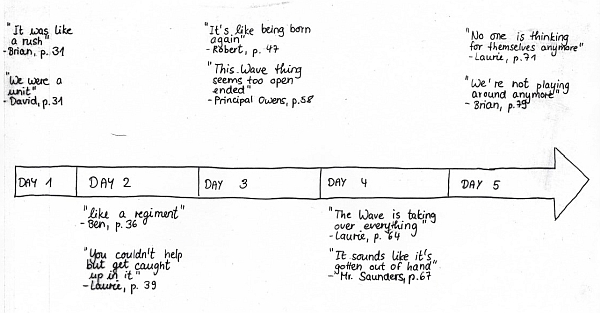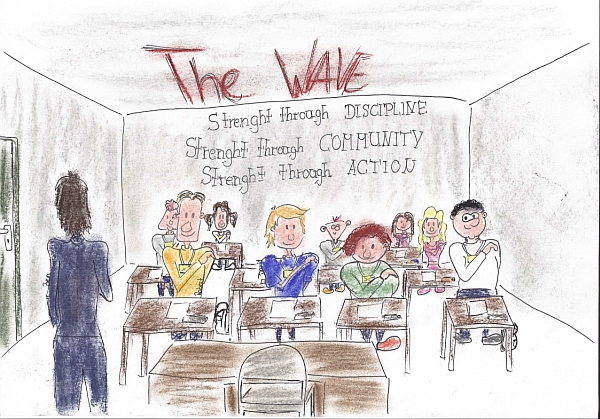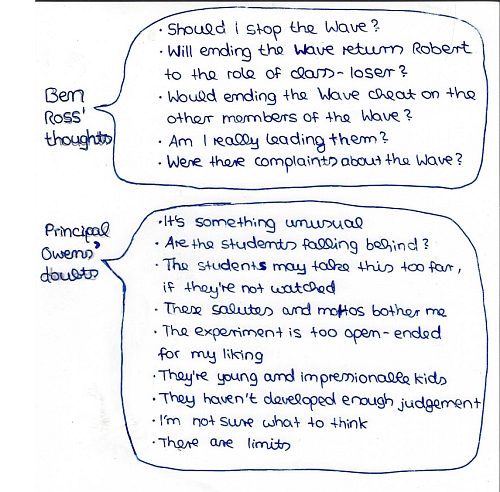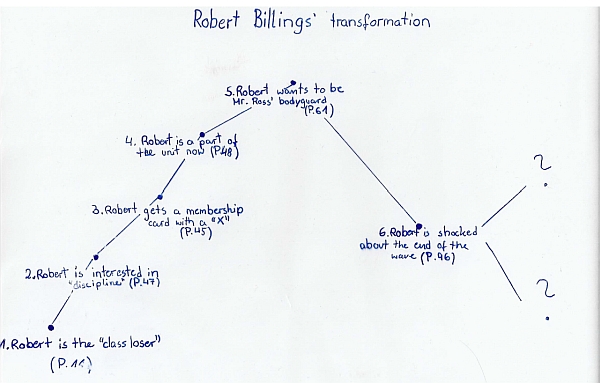Tracking The Wave · 5. August 2016
An Experiment in 1969 and a Group Project in 2016
Having completed the obligatory schoolbook towards the end of the school year, the students of 10d decided to read Morton Rhue’s The Wave and demonstrated their interest in and engagement with this text in a wide variety of ways. The following is a sample of the various projects presented.
“Experiment and Progression” (Lena N.)

DAY 1
- Ben teaches the students the right posture.
- they have to walk around the room.
- when he gives the command, they have to return to their seats immediately.
- when they answer a question, they have to stand up, say “Mr. Ross” and answer in as short a way as possible.
DAY 2
- the students demonstrate the new discipline.
- they call it “The Wave”, create a salutation and mottos.
- David tells the football team about The Wave.
DAY 3
- a poster showing The Wave symbol is hung in the classroom.
- Ben wears a suit.
- students get membership cards.
- some of the students with a red X are asked to report if anyone does not obey the rules.
- Ben becomes their leader and has control over them.
- The Wave spreads: more and more students visit Ben’s history class skipping their other classes.
DAY 4
- The Wave posters appear all over school.
- Ben becomes the ultimate leader when he allows Robert to be his bodyguard.
- a prep rally changes into The Wave rally.
- The Wave members become violent beating a Jewish person.
- people who do not join get excluded
- Laurie describes the Wave as a dangerous and mindless movement suppressing freedom of speech and thought.
DAY 5
- The Wave is hurting people, physically and mentally.
- after the publication of the article in the Grapevine, more people become skeptical.
- The Wave members want to stop people from voicing any negative opinions of the Wave.
- the students have become a group with fascist characteristics.
Summarizing the similarities between The Wave and National Socialism:
- In the beginning the students only see the advantages of The Wave. Similarly, in the beginning Hitler was seen as charismatic, and no one thought him dangerous.
- The Wave’s three mottos are: Strength through Discipline, Strength through Community, Strength through Action; its symbol: a wave. Similarly, National socialism was based on ideologies (e.g. racial ideology); its symbol: a swastika.
- The Wave excluded students and beat up a boy. Similarly, the National socialists persecuted nonmembers and resorted to violence.
A visual representation of Chapter 8 (Franziska G.)

This picture shows Ben Ross’s class while the pupils are doing the sign of The Wave. The scene takes place in Chapter 8 after Ben Ross has handed out the yellow membership cards. The mottos of The Wave are written on the wall in the center of the picture.
Description of Chapter 10 (Lena F. and Franziska P.)
While Ben Ross was in the faculty lounge, he was told to go to Principal Owens’ office. On his way he saw many students show him The Wave salute. Ben was wondering whether Mr. Owens wanted to talk with him about The Wave. He was also thinking that he should stop the experiment. Then he thought about Christy saying that Robert Billings had changed into a new person. Ben asked himself if stopping The Wave would be possible and what its consequences would be. He felt like a leader but then realized that The Wave was only a classroom experiment.
Ben entered the office of Principal Owens who told him that he had heard nothing bad about The Wave. Then the principal wanted to hear how The Wave had begun and Ben started to explain that everything began with a film that he had shown about the Nazis several days earlier. Having explained The Wave to the principal, Ben noticed that the principal didn’t look very happy. Principal Owens thought that the experiment wasn’t good for the students who were involved in it. Even though Ben said that his wife had noticed an improvement in her class because of The Wave, Principal Owens was still critical of The Wave’s mottos and its salute. While Ben was of the opinion that the project would not get out of hand as long as he was its leader, Principal Owens was not sure what to think about The Wave. Young people are so easy to manipulate, he said.
After Ben had promised that nothing would get out of control, the principal agreed. After all, Ben Ross had never before given him any reason for doubt.

Questions:
- What would happen if Ben ended The Wave?
- What do you think is positive and what is negative about The Wave?
Summary of Chapter 14 (Luisa T.)
- Laurie publishes her article about the bad influence of The Wave.
- She talks with Amy and finds out that she supports The Wave which is important because of their relationship.
- Ben realizes that his experiment has gone wrong.
- Ben, a dictator?
- David and the other members of The Wave want to stop Laurie.
- David and Brian want to talk with Laurie.
My opinion:
This is a very important chapter because it shows that . . .
- there is some competition between Laurie and Amy.
- Ben Ross has to stop The Wave because he no longer has any control and
- David still has feelings for Laurie.
Questions:
- Do you think that Laurie and Amy will be able to have a good relationship again?
- Why does Laurie say that The Wave is like the “night of the living dead”?
- Why do you think that the football team is not successful?

“Robert Billings’ transformation” (Antonia K.)
1. ”Class loser”
- Robert falls asleep during the history movie > is not very interested in school.
- his brother was a star at the school with the best grades and a lot of friends > Robert feels pressured to be like him but he thinks he is not able to keep up.
- Robert has no friends>the other pupils think he is “strange” (p. 21) because he likes to read comic books and doesn’t really care about his appearance.
2. Robert is interested in Mr. Ross’s motto “strength through discipline”.
- the exercises offer something new. Robert has only to do what Mr. Ross tells him. He doesn’t have to think for himself.
- Robert wants to be good trying to sit straight and wanting to help the class get to their seats quickly when Mr. Ross times them.
- Robert also tries not to look so messy.
3. Robert gets a “X” membership card.
- he is a monitor now and so has an important position in the community of The Wave.
- he is very interested in the group and wants to act as Mr. Ross says, e.g. making the salute.
4. Robert is part of the unit now.
- the others start to like him. He is a member of The Wave and sits with the others in the cafeteria.
- he takes the wave very seriously now; he believes in it and does not want anybody to destroy it.
- he is like “a new human” now (p. 100).
5. Robert becomes Mr. Ross’s bodyguard
Why do you think Robert wants to be his bodyguard?
- he is so focused on The Wave because he can see that it is changing his life in a good way.
- he thinks Mr. Ross needs somebody to protect him because as the founder of The Wave, he is an important person.
- this is a way to say “thank you” to Mr. Ross.
- this position makes him feel very important. He can’t allow Laurie to destroy The Wave and take his new position away from him.
6. Robert is shocked at how The Wave ends
- he can’t believe that The Wave was only an experiment.
Question:
- Will Robert’s life change without The Wave or will he return to being the “class loser”?
My opinion:
Robert wants to change his life. After the conversation with Mr. Ross at the end of the book, he realizes that The Wave was really not as positive as he first thought. But he does not have to be the class loser because he knows now that his behavior before The Wave wasn’t so good either.
I think, Robert became so loyal to The Wave because at first he had no personal interests and felt very excluded. The Wave provided him with a purpose and something he could concentrate on.
Laurie Saunders, a description of character (Jasmin G.)
Laurie has long, brown hair, is very pretty and lives with her parents. She is clever, ambitious and just about 17 years old. She visits Gordon High School where she is well liked by both the other pupils and her teachers. Laurie is the editor-in-chief of the school’s newspaper “The Grapevine”. When nervous or under stress, she chews her pen. Laurie’s best friend is Amy Smith. She is also in a relationship with David Collins, a football player and fellow pupil at her school.
If Laurie has an opinion, she is not afraid of expressing it. This is because she was brought up to be an individual, to be independent, single-minded and optimistic. Working for the school newspaper, Laurie can prove that she is a team player and that she has the ability to influence people.
When The Wave takes off, Laurie is first inspired, however she notices relatively fast that she does not really agree with it. She therefore refuses to give the wave salute and writes an article which exposes the negative aspects of The Wave. Doing this, she offends her friends, even David. After a quarrel with him, however, they reconcile and go to their teacher Ben Ross to ask him to end the experiment.
Questions:
Why does David end the relationship with Laurie?
What does Laurie finally think of The Wave?

A Crossword Puzzle about Chapter 15 (Lea S. and Charlotte M.)
Vertical:
1. What are The Wave’s mottos in short?
3. What does Christy call her husband?
10. If Laurie did not agree willingly, how did she agree?
11. Who was waiting for Laurie with David?
12. What were Laurie’s remarks when David tried to talk to her?
13. How should the students follow Ben according to Christy?
Horizontal:
2. Which subject does Mr. Ross teach?
4. What is the name of the school paper?
5. What is the religious background of the boy beaten up after school?
6. What is the name of the school?
7. What position does Laurie have in the Grapevine?
8. What is the name of one of the students Laurie thought of?
9. Did David feel bad after punching Laurie?
14. What was written on Laurie’s locker door?
15. Where did Brian and David wait for Laurie?
16. What is Ben Ross for the students?
17. What did the Grapevine staff celebrate after school?
Solutions:
1. Discipline, action, community
2. History
3. Honey
4. Grapevine
5. Jewish
6. Gordon High
7. Editor-in-chief
8. Alex Cooper
9. Yes
10. Reluctantly
11. Brian
12. Antagonistic
13. Blindly
14. Enemy
15. Van
16. Leader
17. Victory
Interpretations of additional texts
“I believe the wave could happen but not in my school” (introduced by Jasmin W., Cosima G., Vicky J.)
Some New Jersey students had a discussion about The Wave at the Scholastic’s New York offices. We, Jasmin, Cosima and Vicky, chose a few questions which were interesting to us. Below, we record those questions, the students’ answers and, in addition, our own opinions.
Is The Wave believable?
The students think that this could happen, but they also think that they would not join because they think of themselves as individuals and “don’t go along with [things] automatically.” (p. 99 l. 19)
Our opinion: We think that something like The Wave is believable. We also find it believable that so many students joined because of peer pressure. It is very hard to stand by your opinion, especially when everyone else is critical.
Does peer pressure exist among teenagers?
The students think that peer pressure does indeed exist. “You can see it all around. If everyone’s drinking at a party and you don’t want to. . . . [i]t’s like. ‘Who is HE?!’” (pp. 100-101)
Our opinion: Peer pressure definitely exists. Young people can be manipulated very easily because they are looking for acceptance and don’t want to be an outsider. Therefore, they are willing to do bad things to belong and they don’t think about the consequences.
“Submission to Authority” (Stanley Milgram) (introduced by Lena N., Franziska P., Jasmin G.)
As soon as someone knows your thoughts, he can exploit, use, and manipulate you. He can make you the way he wants you to be, if his intentions are bad. While people have their own individual perception of a situation, they also have the propensity to accept definitions given them by an authority. Because of this, an authority can have an influence on your opinion and can possibly manipulate you. At the same time, it is acceptable to obey an authority figure and to have a subordinate position.
The dangerous thing is that people who are in subordinate posititons often feel responsible “to the authority directing him” (p. 106 l.23), while they do not feel responsible for something that their leader wanted them to do. The only thing of interest to them is that the authority they listen to is satisfied with their services. Nothing else matters.
“Totalitarian Movements” (Hannah Arendt) (introduced by Luisa T., Paula R. and Antonia K.)
Totalitarian movements are possible whenever and wherever. . . .
- . . . there are masses of people.
- . . . these masses of people have no interests and are not able to articulate themselves well.
- . . . the majority of people are politically indifferent.
These were the conditions at the rise of the Nazi movement.
Question:
How could a leader such as Hitler or Stalin maintain the leadership of large populations?
Answer:
• they had the confidence of the masses.
• they were supported by members of their party.
In conclusion:
Dictatorships are not possible without members’ (oftentimes voluntary) support.
Group Project Leader: U. Roesch
|





